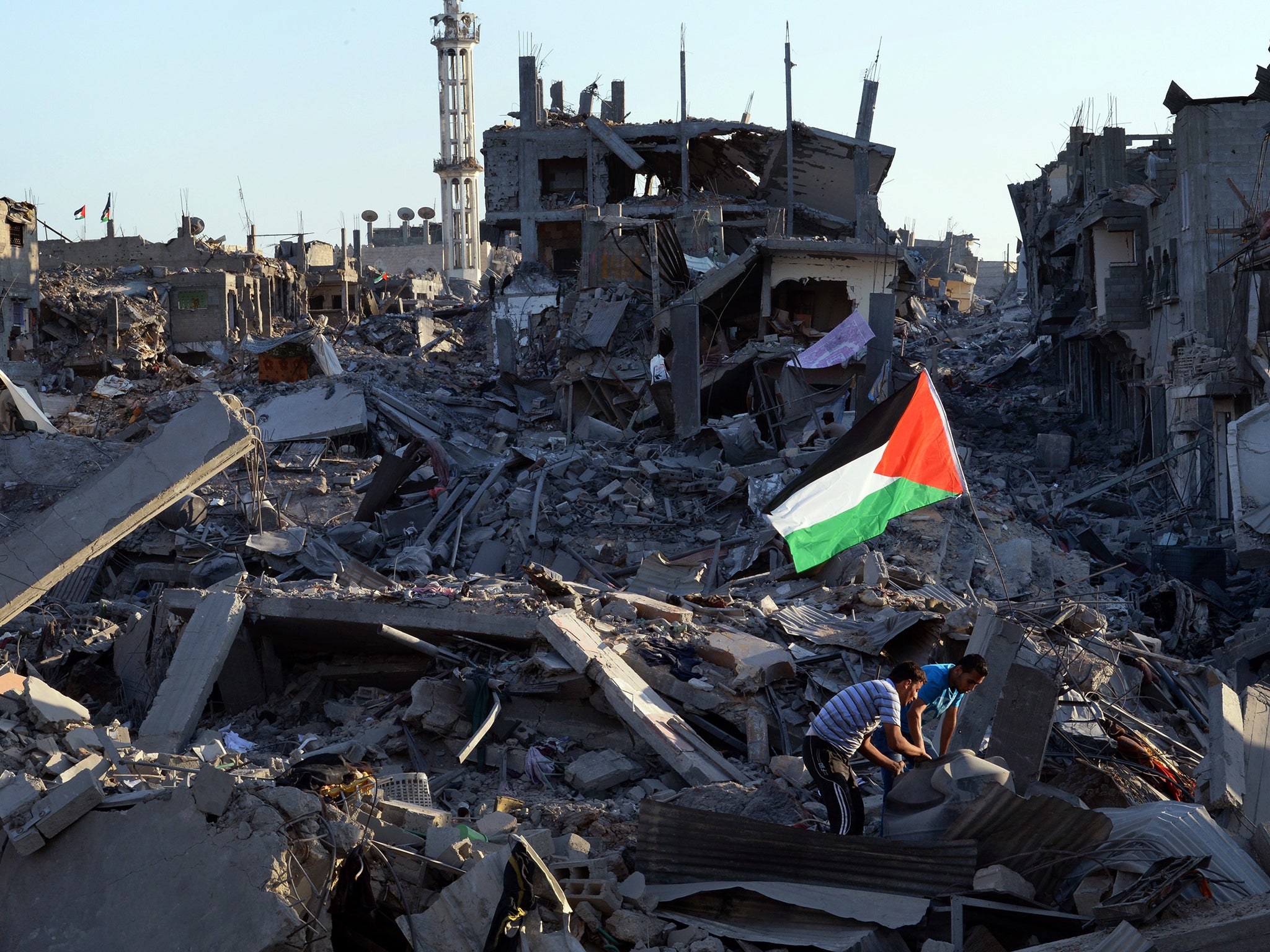Diplomatic Channels: Gaza is in ruins – but having negotiated with weapons, Hamas may now do so with words
Only 1 per cent of the five million tonnes of construction material required after such devastation has been delivered so far

Four months after last summer’s bloody war Gaza remains in ruins, with little or no reconstruction, a continuing blockade, unemployment rising towards 70 per cent and a desperate and angry population.
This scenario is not disputed by the three parties officially engaged in tackling the crisis – Palestinians, Israelis and the international community. The differences lie in their reaction to it.
Just a fraction of the construction material required after such devastation has been delivered so far – only 1 per cent of the five million tonnes needed. Similarly, extremely little of the $5bn pledged from abroad – 1.2 per cent – has been sent so far. The number of homeless, meanwhile, stands at 50,000.
I was given conflicting versions of the reasons for this on my return to Gaza and Israel last week for the first time since the summer conflict. A Palestinian reason was that Israel has imposed draconian conditions for allowing in the material for rebuilding because it does not want Gaza to recover, but to be a crippled economy, a people dependent on aid.
Hamas in pictures
Show all 10The Israeli narrative was that the security measures were essential to stop Hamas from using the supplies to replace the destroyed network of tunnels under the border. Hamas, it continued, was happy to leave Gaza in its current devastated state for propaganda value.
The reality is more complex. The regime for reconstruction was set up between Israel, the Palestinian “unity” government of Hamas and Fatah, with Fatah taking the lead, and the United Nations. Looking at some of the individual cases of delay, it becomes clear that the fault was not just one sided, although an easing of the Israeli siege and the promised international funds would make a huge difference.
But, even if it managed to pass on culpability for lack of development to Fatah, Hamas face serious problems. Its stock was high during the war even among those who were not their natural supporters. But now there is rising criticism in the streets, some of it being expressed surprisingly openly.
Palestinian officials disclosed that final consultations on the UN draft resolution on statehood was under way, with the possibility of seeking a vote at the Security Council on Wednesday. Even if the US uses its veto, the dynamics are shifting, they insisted. Hamas is reviewing its strategy with the changing times. It is conducting an internal debate, with proposals which have had to be officially refuted.
One such proposal was for direct negotiations with the Israelis, currently forbidden by the movement’s constitution. A statement was issued saying direct negotiations with Israel is not the movement’s policy and is not on the table for discussion. The call, however, had come from none other than Mousa Abu Marzouk, the deputy political chief of Hamas. “We have negotiated with Israel using weapons; so it is possible to negotiate with words,” he stressed. One valuable advantage, he said, would be limiting the meddling of mediators – foreign powers who often have their own agendas.
There is a need, say some senior figures, to break entirely from old precepts in foreign relations. Sheikh Ahmad Yousef, one of the movement’s ideologues, told me that direct talks should not only be held with Israel but the West as well. “We have to acknowledge that there is a negative image of us among some in Europe and America. We can carry on and let that continue, or we can talk to these countries, put forward our case, exchange ideas: that seems to us to be the practical way forward.”
Hamas needs to rethink its whole strategy, held Sheikh Ahmad, looking at what has been learnt from successive rounds of conflicts and negotiations and also be prepared to make changes to its 27-year-old manifesto, especially the parts in it which can be viewed as anti-Semitic. At the same time everything possible must be done to distance the movement from al-Qaeda and Isis, “making it very clear that the Islam we believe in is very different from theirs”.
Some of Sheikh Ahmad’s ideas were introduced at a conference in Birzeit University near Ramallah. “The reaction was, overall, quite good. There is a new generation of young leaders coming up, and they are the people we should look to to carry out the reforms necessary,” he said.
One of the most fundamental issues the Palestinians have to address is the division between Fatah and Hamas, the “unity” government is hardly united. Whose fault is that? “It has become a matter of people blaming each other and I don’t want to add to that,” was the careful response of Sheikh Ahmad, who wants close ties between the two groups. “It would not be helpful.”
Fatah’s Mufid al-Hassaina, the minister for public works and housing and one of four in the cabinet based in Gaza, is equally guarded when asked about the schism. He too rues the blame game.
“It is one of the things I dislike most about politics. I have got a very difficult job here in Gaza: reconstruction. I don’t want to be distracted by divisions.”
But how can Palestinians address the problems facing them if they do not bridge the divisions?
“Yes” said the minister after a pause. “I would say we are in the worst situation since 1948, but it is also an opportunity to take some really positive steps for the future, if not we are going to have an explosion.”
Subscribe to Independent Premium to bookmark this article
Want to bookmark your favourite articles and stories to read or reference later? Start your Independent Premium subscription today.

Join our commenting forum
Join thought-provoking conversations, follow other Independent readers and see their replies